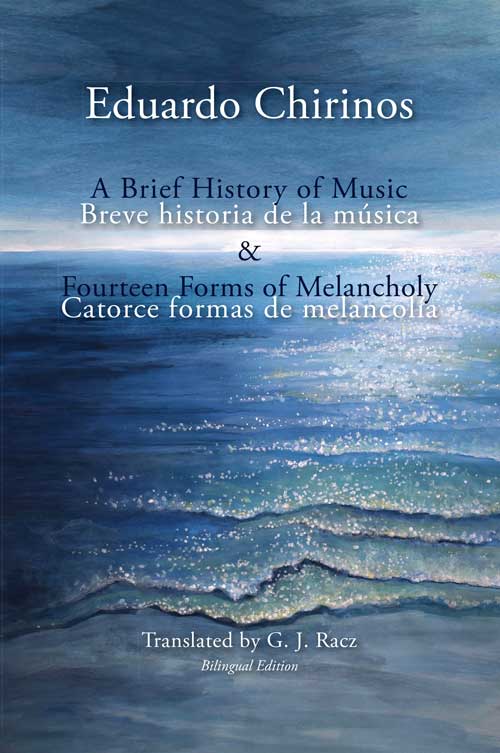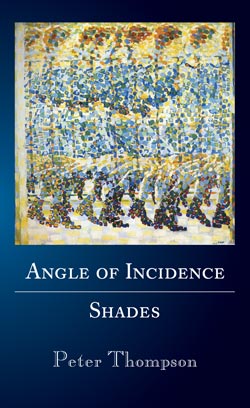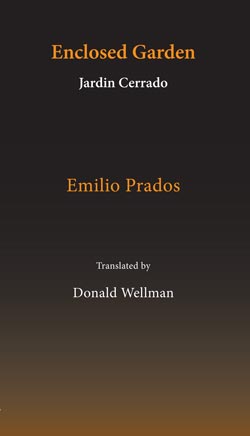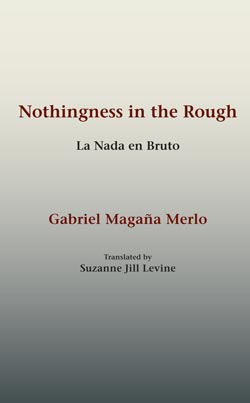Description
Eduardo Chirinos
Translated by G. J. Racz
A Brief History of Music &
Fourteen Forms of Melancholy
ISBN 978-1-944884-89-5
120 pages
November 1, 2020
Bilingual
A Brief History of Music is the first complete English-language translation of the late Peruvian writer Eduardo Chirinos’s Breve historia de la música, which was awarded the inaugural Premio Case de América de Poesía Americana prize in 2011. The poems in this singular, often poignant collection reflect Chirinos’s fascination with music, one of the recurrent topics of his extensive poetic oeuvre alongside childhood, animals, film, the vagaries of memory, painting, and even the poetic tradition itself. Each of the twenty-three carefully crafted pieces here provides an imaginative scenario accompanying a chosen musical piece, from an anonymous Berbérie song to twentieth-century atonal works, featuring favorite compositions by such classical greats as Bach, Vivaldi, Mozart, Beethoven, Chopin, Liszt, Sibelius, Debussy, Gershwin, and Stravinsky, among others. This ninth volume of Chirinos’s verse available in English, all translated by G. J. Racz, also includes the delightfully playful, meditative “Fourteen Forms of Melancholy,” whose wistful, though ludic tone covers many of the themes found throughout Chirinos’s unique, affecting work. This is the second collaboration between Chirinos and Racz to be published by Diálogos. While the Wolf Is Around appeared from this press in 2014.
Once again, G.J. Racz gracefully walks the cords that bridge language, music and poetry to offer the reader a magnificent bilingual edition: Breve historia de la música & Catorce formas de melancolía / A Brief History of Music & Fourteen Forms of Melancholy by the late Eduardo Chirinos.
“The poem´s music, though, will always be manifested in words, which is why it´s so hard to translate it into other languages. Its images, rhythms, and silences belong to its own tongue, and thus to a community as well as a history that gives it meaning.” (Eduardo Chirinos)
This book will serve as an eternal memorial, song and topographic map of both Chirinos´s craft and inspiration.
—Zachary Payne, Windward Community College, editor of Kloaka: antología poética and Hora Zero: óperas primas
Once again Racz’s poetic sensibility impresses. Every syllabic morsel in this translation is lovingly treated, each word is captured elegance, each line is shaped with clarity and precision, and all are placed with expertise. The book breathes in English. Not only do the verses ring and sound, sing and play, the spaces and silences, beautifully mirroring the original poems in Spanish, swell, echo, and invite the music.
—Claudia Routon, University of North Dakota, translator of Sky Chess by Antonio Agudelo
More than a catalogue of musical moments, this book traces a range of sensations, offering a series of verbal accompaniments that exist in parallel with the works to which they pay homage. Chirinos translates music into poetry not to imitate notes, but to peer into the cracks between them, conjuring quiet, private scenes that might evoke the landscape of Sibelius’s Finland or the estrangement of a medieval Sephardic song. G. J. Racz’s renderings are delicate but supple, and perfectly ventriloquize Chirinos’s elegant, sometimes whimsical voice.
—Charlotte Whittle, editor, Cardboard House Press, and translator of People in the Room by Norah Lange
A Brief History of Music and “Fourteen Forms of Melancholy” is a remarkable piece played deftly by four hands: Chirinos does not cite these melodies so much as channel them, and Racz renders his taut riffs without missing a beat. Their focus may be on the ear, but these are poems that reverberate throughout the body.
—Heather Cleary, Sarah Lawrence College, translator of Poems to Read on a Streetcar by Oliverio Girondo
With A Brief History of Music, Eduardo Chirinos fully enters the musical universe through true “illuminations” (in the Rimbaudian sense of the word). The title does not announce some impossible encyclopedia of European music or emulate its rhythms and timbres, but presents the author’s most salient experiences in relation to chosen pieces and composers, letting language emerge with its own music—one that binds sound and meaning—rendering it, for that reason, untranslatable. In “Fourteen Forms of Melancholy,” his gaze stops at the passage of time and the deterioration of body and world. As if foreseeing the poet’s untimely death, this short piece heralds a fatalistic vision that assails the human: we all must die and our bodies inevitably pass from autumn to winter. After that, who knows? In the meantime, poetry comes like a dream that disappears with the first light of day, words the poet is condemned to reconstruct when he wakes.
—José Antonio Mazzotti, Tufts University, author of Sakra Boccata
This, I believe, is G. J. Racz’s best translation of Eduardo Chirinos’s poetry yet. It took me back to those occasions on which I was privileged to hear both of them read their versions side by side. Then, paradoxically because of the translations, the condition of music was not denied to literature.
—Jorge Marcone, Rutgers University, author of La oralidad escrita






Reviews
There are no reviews yet.